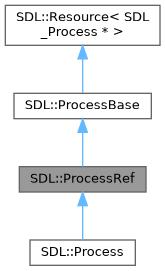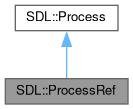Semi-safe reference for Process.


Public Member Functions | |
| ProcessRef (ProcessParam resource) noexcept | |
| Constructs from ProcessParam. More... | |
| ProcessRef (ProcessRaw resource) noexcept | |
| Constructs from ProcessParam. More... | |
| constexpr | ProcessRef (const ProcessRef &other) noexcept=default |
| Copy constructor. | |
| ~ProcessRef () | |
| Destructor. | |
| constexpr | Process (std::nullptr_t=nullptr) noexcept |
| Default ctor. | |
| constexpr | Process (const ProcessRaw resource) noexcept |
| Constructs from ProcessParam. More... | |
| constexpr | Process (const Process &other) noexcept=default |
| Copy constructor. | |
| constexpr | Process (Process &&other) noexcept |
| Move constructor. | |
| constexpr | Process (const ProcessRef &other)=delete |
| constexpr | Process (ProcessRef &&other)=delete |
| Process (const char *const *args, bool pipe_stdio) | |
| Create a new process. More... | |
| Process (PropertiesParam props) | |
| Create a new process with the specified properties. More... | |
 Public Member Functions inherited from SDL::Process Public Member Functions inherited from SDL::Process | |
| constexpr | Process (std::nullptr_t=nullptr) noexcept |
| Default ctor. | |
| constexpr | Process (const ProcessRaw resource) noexcept |
| Constructs from ProcessParam. More... | |
| constexpr | Process (Process &&other) noexcept |
| Move constructor. | |
| constexpr | Process (const ProcessRef &other)=delete |
| constexpr | Process (ProcessRef &&other)=delete |
| Process (const char *const *args, bool pipe_stdio) | |
| Create a new process. More... | |
| Process (PropertiesParam props) | |
| Create a new process with the specified properties. More... | |
| ~Process () | |
| Destructor. | |
| constexpr Process & | operator= (Process &&other) noexcept |
| Assignment operator. | |
| constexpr ProcessRaw | get () const noexcept |
| Retrieves underlying ProcessRaw. | |
| constexpr ProcessRaw | release () noexcept |
| Retrieves underlying ProcessRaw and clear this. | |
| constexpr auto | operator<=> (const Process &other) const noexcept=default |
| Comparison. | |
| constexpr | operator bool () const noexcept |
| Converts to bool. | |
| constexpr | operator ProcessParam () const noexcept |
| Converts to ProcessParam. | |
| void | Destroy () |
| Destroy a previously created process object. More... | |
| PropertiesRef | GetProperties () const |
| Get the properties associated with a process. More... | |
| StringResult | Read (int *exitcode=nullptr) |
| Read all the output from a process. More... | |
| template<class T > | |
| OwnArray< T > | ReadAs (int *exitcode=nullptr) |
| Read all the output from a process. More... | |
| IOStreamRef | GetInput () |
| Get the IOStream associated with process standard input. More... | |
| IOStreamRef | GetOutput () |
| Get the IOStream associated with process standard output. More... | |
| void | Kill (bool force) |
| Stop a process. More... | |
| bool | Wait (bool block, int *exitcode) |
| Wait for a process to finish. More... | |
Additional Inherited Members | |
 Protected Member Functions inherited from SDL::Process Protected Member Functions inherited from SDL::Process | |
| constexpr | Process (const Process &other) noexcept=default |
| Copy constructor. | |
| constexpr Process & | operator= (const Process &other) noexcept=default |
| Assignment operator. | |
Constructor & Destructor Documentation
◆ ProcessRef() [1/2]
|
inlinenoexcept |
- Parameters
-
resource a ProcessRaw or Process.
This does not takes ownership!
◆ ProcessRef() [2/2]
|
inlinenoexcept |
- Parameters
-
resource a ProcessRaw or Process.
This does not takes ownership!
Member Function Documentation
◆ Process() [1/3]
|
inline |
The path to the executable is supplied in args[0]. args[1..N] are additional arguments passed on the command line of the new process, and the argument list should be terminated with a nullptr, e.g.:
Setting pipe_stdio to true is equivalent to setting prop::process.CREATE_STDIN_NUMBER and prop::process.CREATE_STDOUT_NUMBER to PROCESS_STDIO_APP, and will allow the use of Process.Read() or Process.GetInput() and Process.GetOutput().
See Process.Process() for more details.
- Parameters
-
args the path and arguments for the new process. pipe_stdio true to create pipes to the process's standard input and from the process's standard output, false for the process to have no input and inherit the application's standard output.
- Postcondition
- the newly created and running process, or nullptr if the process couldn't be created.
- Thread safety:
- It is safe to call this function from any thread.
- Since
- This function is available since SDL 3.2.0.
◆ Process() [2/3]
|
inlineexplicitconstexprnoexcept |
- Parameters
-
resource a ProcessRaw to be wrapped.
This assumes the ownership, call release() if you need to take back.
◆ Process() [3/3]
|
inline |
These are the supported properties:
prop::process.CREATE_ARGS_POINTER: an array of strings containing the program to run, any arguments, and a nullptr pointer, e.g. const char *args[] = { "myprogram", "argument", nullptr }. This is a required property.prop::process.CREATE_ENVIRONMENT_POINTER: an Environment pointer. If this property is set, it will be the entire environment for the process, otherwise the current environment is used.prop::process.CREATE_WORKING_DIRECTORY_STRING: a UTF-8 encoded string representing the working directory for the process, defaults to the current working directory.prop::process.CREATE_STDIN_NUMBER: an ProcessIO value describing where standard input for the process comes from, defaults toSDL_PROCESS_STDIO_nullptr.prop::process.CREATE_STDIN_POINTER: an IOStream pointer used for standard input whenprop::process.CREATE_STDIN_NUMBERis set toPROCESS_STDIO_REDIRECT.prop::process.CREATE_STDOUT_NUMBER: an ProcessIO value describing where standard output for the process goes to, defaults toPROCESS_STDIO_INHERITED.prop::process.CREATE_STDOUT_POINTER: an IOStream pointer used for standard output whenprop::process.CREATE_STDOUT_NUMBERis set toPROCESS_STDIO_REDIRECT.prop::process.CREATE_STDERR_NUMBER: an ProcessIO value describing where standard error for the process goes to, defaults toPROCESS_STDIO_INHERITED.prop::process.CREATE_STDERR_POINTER: an IOStream pointer used for standard error whenprop::process.CREATE_STDERR_NUMBERis set toPROCESS_STDIO_REDIRECT.prop::process.CREATE_STDERR_TO_STDOUT_BOOLEAN: true if the error output of the process should be redirected into the standard output of the process. This property has no effect ifprop::process.CREATE_STDERR_NUMBERis set.prop::process.CREATE_BACKGROUND_BOOLEAN: true if the process should run in the background. In this case the default input and output isSDL_PROCESS_STDIO_nullptrand the exitcode of the process is not available, and will always be 0.prop::process.CREATE_CMDLINE_STRING: a string containing the program to run and any parameters. This string is passed directly toCreateProcesson Windows, and does nothing on other platforms. This property is only important if you want to start programs that does non-standard command-line processing, and in most cases usingprop::process.CREATE_ARGS_POINTERis sufficient.
On POSIX platforms, wait() and waitpid(-1, ...) should not be called, and SIGCHLD should not be ignored or handled because those would prevent SDL from properly tracking the lifetime of the underlying process. You should use Process.Wait() instead.
- Parameters
-
props the properties to use.
- Postcondition
- the newly created and running process, or nullptr if the process couldn't be created.
- Thread safety:
- It is safe to call this function from any thread.
- Since
- This function is available since SDL 3.2.0.
The documentation for this struct was generated from the following file:
- SDL3pp/SDL3pp_process.h